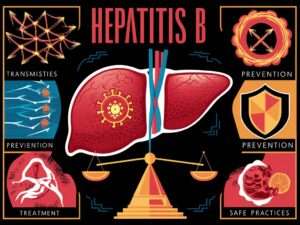Understanding Hepatitis B: Transmission, Prevention and Treatment
Hepatitis B is a serious liver infection caused by the hepatitis B virus (HBV). This potentially life-threatening disease affects millions of people worldwide, making it crucial to understand how it spreads and how to protect yourself. In this comprehensive guide, we’ll explore the various ways hepatitis B is transmitted, preventive measures, and treatment options.
HPV Vaccine and Oral HPV: Understanding the Connection and Protection

Table of Contents
ToggleHow Is Hepatitis B Transmitted?
Hepatitis B is primarily spread through contact with infected blood, semen, and other body fluids. Let’s delve into the most common transmission routes:
1. Sexual Contact
Unprotected sexual intercourse with an infected person is one of the primary ways hepatitis B spreads. This includes:
– Vaginal sex
– Anal sex
– Oral sex
The risk increases with multiple sexual partners or a history of sexually transmitted infections (STIs).
Genital Warts: Duration, Treatment, and Prevention – A Comprehensive Guide

2. Sharing Needles or Syringes
Intravenous drug users who share needles or other drug paraphernalia are at high risk of contracting hepatitis B. The virus can survive outside the body for at least seven days, making even dried blood infectious.
3. Mother-to-Child Transmission
Pregnant women infected with hepatitis B can pass the virus to their babies during childbirth. This is called vertical transmission and is a significant concern in regions with high hepatitis B prevalence.
HPV in Guys: What Every Man Needs to Know
4. Accidental Needle Sticks
Healthcare workers and first responders are at risk of acquiring hepatitis B through accidental needle sticks or other sharp injuries involving infected blood.
5. Blood Transfusions and Organ Transplants
While rare in countries with advanced screening procedures, hepatitis B can be transmitted through contaminated blood products or organ transplants.
6. Sharing Personal Items
The virus can spread through sharing personal items that may have come into contact with infected blood, such as:
– Razors
– Toothbrushes
– Nail clippers
7. Body Piercings and Tattoos
Unsterilized equipment used for body piercings or tattoos can transmit hepatitis B if contaminated with infected blood.
HPV in Men: A Comprehensive Guide to Understanding, Prevention and Treatment
Preventing Hepatitis B Transmission
Prevention is key in controlling the spread of hepatitis B. Here are effective strategies to protect yourself and others:
HPV Dormancy: Understanding the Silent Phase of the Human Papillomavirus

1. Vaccination
The hepatitis B vaccine is the most effective way to prevent infection. The Centers for Disease Control and Prevention (CDC) recommends vaccination for:
– All infants, starting at birth
– Children and adolescents under 19 who haven’t been vaccinated
– Adults at risk of infection
Natural Treatments for HPV: A Comprehensive Guide to Complementary Therapies
The vaccine is typically given in three doses over six months and provides long-lasting protection.
2. Practice Safe Sex
Using barrier methods like condoms and dental dams can significantly reduce the risk of sexual transmission. It’s also important to get tested and know your partner’s hepatitis B status.
3. Don’t Share Personal Items
Avoid sharing items that could potentially come into contact with blood, such as razors, toothbrushes, or nail clippers.
Genital Skin Tags vs. Warts: Understanding the Difference and Treatment Options
4. Use Clean Needles
If you use intravenous drugs, always use new, sterile needles and never share equipment. Many communities offer needle exchange programs to reduce the risk of infections.
5. Take Precautions in Healthcare Settings
Healthcare workers should follow universal precautions, including wearing gloves and proper handling of needles and other sharp instruments.
Granuloma Inguinale: A Comprehensive Guide to the Rare STI
6. Get Tested
Knowing your hepatitis B status is crucial, especially if you’re in a high-risk group or planning to start a family.
7. Prevent Mother-to-Child Transmission
Pregnant women should be tested for hepatitis B. If positive, their babies can receive hepatitis B immune globulin (HBIG) and the first dose of the vaccine within 12 hours of birth.
Mycoplasma Genitalium: The Silent STI You Need to Know About!
Treatment Options for Hepatitis B
While there’s no cure for hepatitis B, treatments can help manage the infection and prevent complications:
1. Acute Hepatitis B
Most people with acute (short-term) hepatitis B don’t require specific treatment. Rest, proper nutrition, and staying hydrated are usually sufficient as the body fights off the infection.
2. Chronic Hepatitis B
For chronic (long-term) hepatitis B, treatment options include:
– Antiviral medications: Drugs like entecavir, tenofovir, and lamivudine can help suppress the virus and slow liver damage.
– Interferon injections: These can boost the immune system’s ability to fight the infection.
– Regular monitoring: Frequent check-ups and liver function tests are essential to track the progression of the disease.
3. Liver Transplant
In severe cases where hepatitis B leads to liver failure, a liver transplant may be necessary.
Living with Hepatitis B
If you’re diagnosed with hepatitis B, it’s crucial to:
– Follow your healthcare provider’s advice and treatment plan
– Avoid alcohol and certain medications that can harm your liver
– Get vaccinated against hepatitis A to prevent additional liver stress
– Inform sexual partners and close contacts so they can get tested and vaccinated
– Join support groups to connect with others living with hepatitis B
Conclusion
Understanding how hepatitis B is transmitted is the first step in preventing its spread. By getting vaccinated, practicing safe behaviors, and seeking prompt medical care if exposed, you can protect yourself and others from this serious liver infection.
Remember, hepatitis B is manageable with proper care and treatment, and many people with the virus lead healthy, fulfilling lives.
Reference to External Sources:
1. Centers for Disease Control and Prevention (CDC) – Hepatitis B Information:
2. World Health Organization (WHO) – Hepatitis B Fact Sheet:
3. National Institute of Diabetes and Digestive and Kidney Diseases (NIDDK) – Hepatitis B:
4. Immunization Action Coalition – Hepatitis B:


